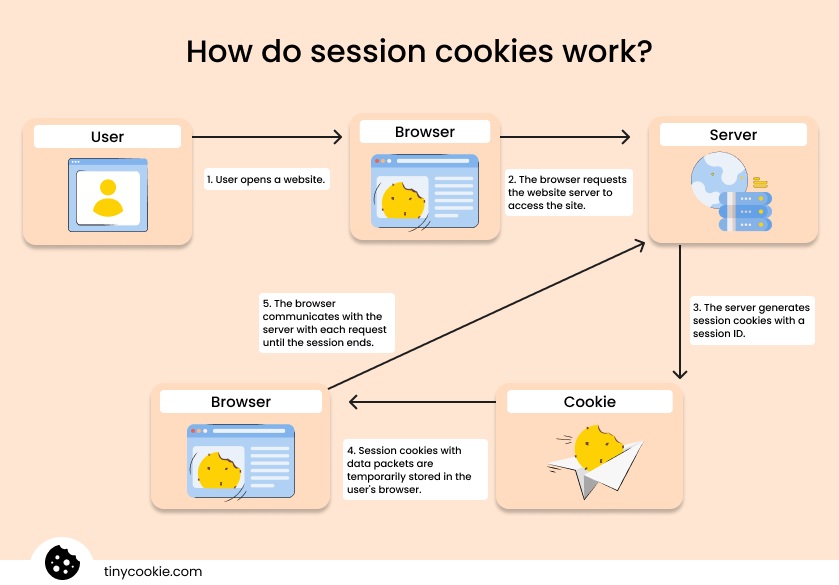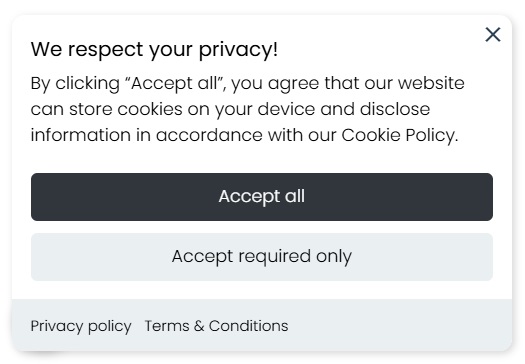Session cookies are an essential part of the user experience. Without them, users would have to log in, re-add shopping cart items, or lose the live chat progress each time they open a different page.
In general, cookies help websites personalize content and create a seamless shopping journey. But how exactly do session cookies improve your browsing? Read on to learn more, as well as how website owners can ensure session cookie compliance with GDPR.
Ensure GDPR compliance with a custom Shopify cookie banner
Try TinyCookie freeWhat is a session cookie?
Session cookies are cookies that store information in a temporary memory location on the user’s browser for the duration of a session. This means from the moment the user opens a website or web app to the time they close the browser window or log out.
Differently from persistent cookies, these cookies are deleted as soon as the session ends unless the browser is set to restore sessions. They’re usually enabled by default and can be used to temporarily remember user activities on the site, such as login credentials or items added to the shopping cart.
How do session cookies work?
Session cookies are created by the server and are only active while you’re browsing the site. It assigns a session ID, which is a randomly generated number, that works as a unique identifier. Here’s how these cookies work:
- The browser requests the website to access the site.
- The server generates session cookies and sends them back to the user’s browser. It’s stored in the temporary memory.
- The browser communicates with the server with each request. For example, to remember products in your shopping cart.
- Once the user ends the session or after prolonged inactivity, the session cookie is automatically deleted.
Where are session cookies stored?
Session cookies are temporarily stored in the browser’s memory until the user closes the website or after a period of inactivity. They’re never stored on the disk and they don’t track activities across other websites, except the website that the cookie belongs to.
What is the purpose of session cookies?
Session cookies create an uninterrupted user experience while the user is browsing the website. Here are a few examples of session cookie benefits:
- Shopping cart. As you add products to your shopping cart, session cookies ensure they don’t disappear during the session as you browse through pages.
- User authentication. Session cookies remember login credentials. They authenticate users, eliminating the need to re-login each time they open a new page on the same website.
- Customer support chat. As you navigate through different pages, session cookies help avoid disruptions and keep the live chat support active.
- Form data. In cases when users need to fill out a form or a quiz, these cookies ensure data is temporarily saved so you don’t lose progress.
- Site preferences. Such cookies can remember user preferences. For example, if the user sets the website’s language to French, cookies remember this choice.
Are session cookies compliant with GDPR?
Session cookies are compliant with the General Data Protection Regulation (GDPR) if you follow specific requirements.
If these cookies are essential for the functionality of a website, they're considered strictly necessary cookies. For example, this includes cookies that help keep you logged in during the session or remember your cart items as you browse the website.
According to the GDPR, such cookies do not require obtaining active user consent. However, while they don’t collect private user information, you must still be transparent with users about session cookie use.
Do session cookies require consent?
Session cookies that are essential for the website to function properly fall under the strictly necessary cookie category. This means they don’t require getting user consent and are enabled automatically.
That being said, it’s obligatory to inform users about what session cookies are used, why, and how. You can do this by updating your privacy policy and adding a GDPR cookie consent banner on your website. It could look something like this:
Manage cookie consent with TinyCookie
If your website uses any kind of cookies, a cookie consent banner is a must. TinyCookie lets you add a banner to your Shopify site in just a few clicks. Just go to the App Store, click install, and follow the setup instructions.
With this app, you can easily ensure GDPR and CCPA or other regulation compliance. And the banner is highly customizable, so you can alter it to fit your brand’s style.
Here’s what you get with TinyCookie:
- One-click cookie bar installation
- Cookie bar content translation
- Cookie scanner
- Automatic consent tracking
- Google Consent Mode V2 support
- Simple cookie management
Ensure GDPR and CCPA compliance on your Shopify website
Try TinyCookie freeFrequently asked questions
The main difference between cookies and sessions is that cookies store data on the client’s device, while sessions are temporarily stored on the server side. Cookies have a set expiration date, while sessions end after a certain period of inactivity or when the user closes the website.
Session cookies last temporarily until the session ends. Sessions may end when the user logs out of a website, closes the browser window, or after a certain period of inactivity.
Session cookies are called cookies because they’re a type of internet cookie. They’re small pieces of data used to exchange information between the user’s browser and the website’s server.
You can check if a website uses session cookies manually in your browser, Just right-click anywhere on your site, click Inspect, and navigate to the Applications tab. Press on Cookies and check which cookies are named “session” under the Expiry date.



